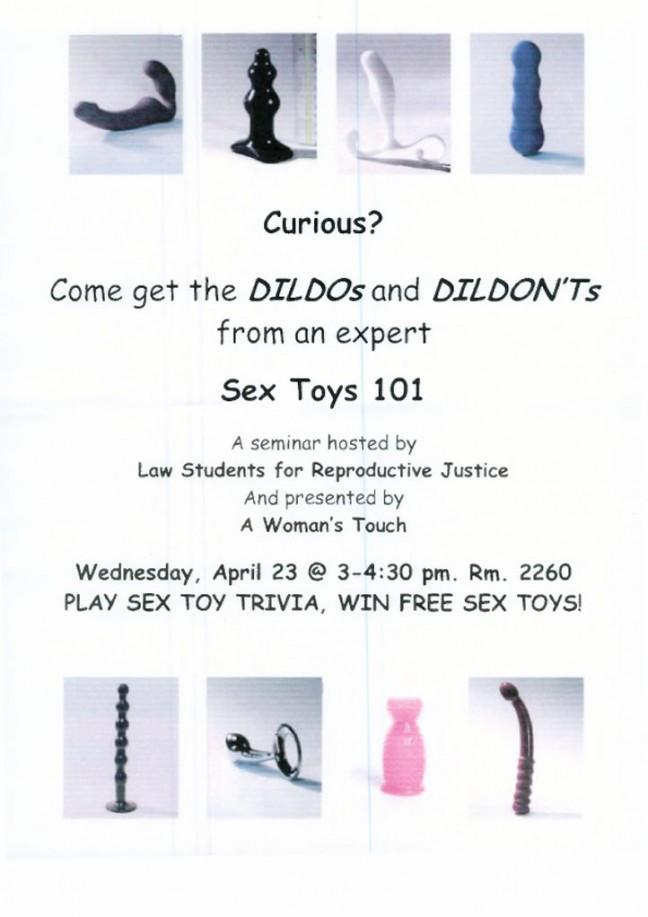The University of Wisconsin Law School canceled an event with controversial sexual content last Wednesday, and some students are calling the action a possible First Amendment violation.
The Wisconsin Law Students for Reproductive Justice had planned an event called “Sex Toys 101” to promote safe alternatives to sex, educate about sexual health and pleasure, and discuss law concerning sex toys, according to the group.
Members of the organization submitted a formal complaint to Law School Dean Ken Davis Friday, requesting a formal apology, refund of event expenses and clarification of student organization event rules.
In an interview Monday, Law School Associate Dean Walter Dickey said the event was canceled for content-neutral reasons, pointing to a Student Organization Office policy that prohibits the promotion or sale of commercial products by a private company.
According to Wisconsin Law Students for Reproductive Justice Chair Maria Selsor, the group brought in an expert from local retailer A Woman’s Touch to give a presentation.
“They received no monetary benefit from coming in — they do it as a public service,” Selsor said. “They’re the only people in the Midwest, basically, that know so much about women’s sexuality, so they’re the perfect people to come in.”
In a response letter to the student group Tuesday, Davis expressed regret for the “misunderstandings and miscommunications” related to the event. He said the group’s expenses for food and beverages would be reimbursed, but that the Law School would not be reimbursing the group for the merchandise they had intended to give away.
He also assured the student group that the event could be rescheduled if the group made sure “no commercial products will be sold, promoted, or endorsed.”
In their complaint sent Friday, however, the students contend even after they told Law School administrators the event did not involve any sales or promotions, Dickey indicated the event should be canceled.
“Dean Dickey’s response was that it did not matter whether it was a sale or not, there were to be ‘no sex toys on law school premises,'” the group said, according to a copy of the complaint obtained by The Badger Herald. The cancellation came just hours before the event was scheduled to begin.
Law School Assistant Dean Ruth Robarts said she was first contacted by the group for clearance in February. She said she told them as long as they stayed within the rules set by the Student Organization Office against selling or promoting material, they could hold the event.
According to the group’s complaint, Robarts accompanied members Wednesday to the room where the event was to have been held. According to the letter, a sign was posted at the room reading, “The event that was scheduled in this room at 3 p.m. is canceled. — Walter Dickey.”
Davis said the signs canceling the event were posted temporarily when administrators were under the impression the event involved the promotion of commercial goods.
Wisconsin Law Students for Reproductive Justice maintains throughout their letter the administrative actions were “both procedurally and substantively unjust” and they were “unfairly targeted in a manner that constitutes both discrimination and a possible violation of our First Amendment rights.”
Dickey said Monday the case was a misunderstanding and that the Law School had no intentions of curtailing the event due to its controversial content.
“In terms of speech and content, it’s a free country, and we’re in the business of promoting it,” Dickey said.
Organizers also took issue with the removal of their posters advertising the event within the halls of the Law School. The posters advertised sex toys as trivia contest prizes, included bondage references and said the event was to be “presented by A Woman’s Touch.”
“We believe they were taken down because some people found them offensive,” Selsor said. “If some people did find them offensive, that’s one thing, but to go around ripping them down we don’t feel is the proper way to go about the situation.”
In an e-mail to the student group last week, Dickey said he gave the go-ahead for staff to remove the posters in the building.
“I also asked that the signs — blatantly promotional material (offensive to many staff and students) — be taken down because they so obviously are for the purpose of promoting commercial products,” Dickey said in the e-mail.
Organizers called the cancellation of the event “pretextual” and pointed out that many law student organizations invite speakers from private companies to speak as experts and have never been called into question in the past.
Davis said part of the confusion about the event was due to the fact it was the Law School’s first experience with this particular event although they host “controversial presentations nearly every day.”
Donald Downs, political science professor and chair of the Committee for Academic Freedom and Rights, said the matter boils down to whether or not the event was indeed a promotion. The key issue, he said, is whether the Wisconsin Law Students for Reproductive Justice ran afoul of established Law School policy.
“Whether they had a basis for shutting down the entire presentation would depend upon how central the promotion of commercial objects was to the presentation,” Downs said. “The larger question to be asked is to what extent can the Law School set reasonable limits on presentations that advocate certain sexual practices because they have an interest in basic decency.”
If the group was simply advocating certain aspects of sexual experiences, Downs said, that would fall within basic First Amendment protections.








